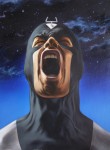Marvel Comics has seen an increase in mainstream popularity with the recent release of several box office hits, such as “The Avengers.” Since its inception in 1939, the comic book company has created thousands of characters. While not all of them may get their due publicity because of a lack of exposure in the silver screen, each has interesting stories to tell in the print medium.
I struggle to think of my favorite Black Bolt line.
But it’s probably because the king of the Inhumans doesn’t really say much.
Black Bolt’s reluctance to speak comes with good reason. Blackagar Boltagon underwent Terrigenesis – an inhuman ritual that grants powerful mutations – while still inside his mother’s womb. The process granted his brain’s speech centers the ability to harness the powers of electrons, but as a drawback, he irrevocably triggers waves of destruction whenever he speaks and has to rely on his wife Medusa as an interpreter. While his abilities also confer him the power of flight, super strength and the devastatingly powerful “quasi-sonic scream” – placing him as one of the most powerful beings in the Marvel Universe – they come at very a heavy personal cost.
Since the character’s creation in 1965, Black Bolt has mostly made appearances in limited series every couple of years, mostly dealing with groups that threaten his people, the Inhumans. In “Silent War,” he attempts to retrieve Terrigen Crystals stolen by the American government, while in “War of Kings,” Black Bolt becomes the leader of the Kree empire and goes toe-to-toe with another alien civilization, the Shi’ar, led by Cyclops and Havok’s estranged brother, Vulcan.
The current state of the Inhumans in the comic book universe is a prime example of how comics have developed into a multimedia franchise, where feature films can make certain characters more popular, a la “Guardians of the Galaxy.” But marketing for feature films can also affect storylines. With plans for an “Inhumans” movie slated for release in four years’ time, Marvel has seemingly rebranded the Inhumans from a close-knit family protecting each other from outsiders to a full-fledged superhero team. Although I understand how the former may not translate as well onto the big screen, I feel that this transition might rob the Inhumans of the charm that has made “Silent War” and “War of Kings” such compelling reads for me.
The change in the Inhumans’ status quo began in the 2013 major crossover event, “Infinity.” The Mad Titan Thanos goes on an Inhuman headhunting rampage, forcing the surviving Inhumans to evacuate to various places on Earth before a fight between Black Bolt and Thanos ends up destroying Attilan, the home of the Inhumans, while Black Bolt’s “quasi-sonic scream” powers up a Terrigen bomb.
In the aftermath of “Infinity,” Black Bolt and his brother Maximus discuss how the Terrigen bomb has unleashed Terrigen Mists across the world, causing a form of global Terrigenesis ushering in a new wave of Inhumans. From a writing standpoint, it allows Marvel to write in new Inhuman characters and expands its character base beyond the Inhuman royal court.
Marvel’s push for an increased prominence of Inhumans in the comic universe has created assumptions among comic book readers that the company wants to use them to replace one of its most popular superhero groups, the X-Men. There’s also the dilemma of Scarlet Witch and Quicksilver, who have spent time in both Avengers and X-Men storylines. This eventually led to more rumors that despite Quicksilver’s role as a mutant in “X-Men: Days of Future Past,” he and Scarlet Witch would have a different role in the Marvel Cinematic Universe, and be introduced in “Avengers: Age of Ultron” as Inhumans, although Marvel Studios President Kevin Feige has since denied that rumor.
Marvel’s newest Inhumans-centered ongoing series “Uncanny Inhumans” only adds fuel to the rumor fire, as the adjective “uncanny” tends to be reserved for X-Men. The “Uncanny X-Men” title was first published in 1963, while a more recent “Uncanny Avengers” title, featuring an Avengers team with a mix of iconic Avengers and X-Men, was created in 2012. Despite the track record, “Uncanny Inhumans“ writer Charles Soule has maintained that the choice of the word “uncanny” in this case is purely semantic.
Black Bolt is scheduled to return to his role as leader of the Inhumans in “Uncanny Inhumans,” with him as the lead of the ongoing series. It will be interesting to see how Black Bolt, who has lived under the influence of Inhuman cultures his entire life, will be able to lead a group that now also consists of members who were once human until the events of the global Terrigenesis.
With an “Inhumans” movie scheduled for 2019, Black Bolt might just have to try and make that connection once again, this time across the silver screen.
